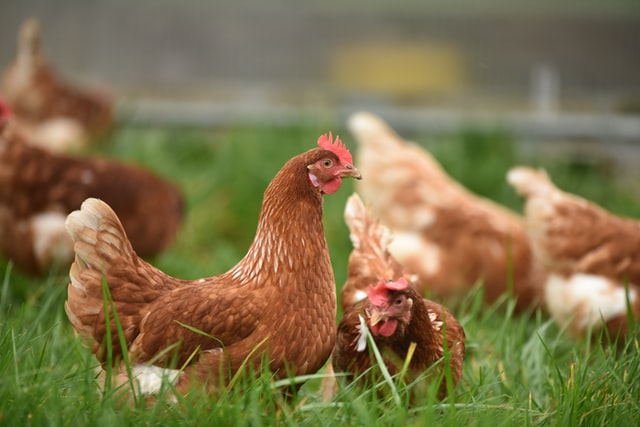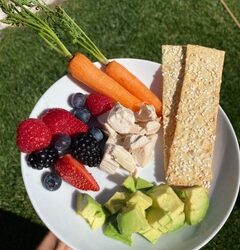How to Pick the Best Eggs
Ever noticed that some egg yolks are a bright vibrant orange and others are pale and dull? With all the terms plastered on egg cartons it’s hard to know which eggs are best.
Get my “Power Up With Protein” tips
Here is a breakdown of what some of the terms mean and which eggs I recommend!
Conventional Eggs: Live their entire lives in small battery cages stacked on top of each other where these can barely move except to lay eggs. On average, each hen typically has about 70 sq. inches of space to live. They may never see the light of day and are usually treated with antibiotics to prevent diseases from spreading.

Cage Free: Literally just means the hens are not kept in cages. It does not mean that they aren’t packed beak to beak (or sadly debeaked) in an overcrowded barn which puts them at risk for disease transmission, unsanitary living conditions or pecking each other to death.
Free-Range: This term simply indicates the hens were not in cages and that they had access to outdoors. It does not specify how much access, how long or if it was on cement, dirt or grass. It also doesn’t mean the hens actually took advantage of the access.
Free to Forage: The hens have been given access to forage outside in grass and dirt. There are no specifications and this term is unregulated.
Pasture Raised: Means the hens are free to roam on pasture outside most of the day and eat their natural diet of grasses and insects. This term by itself does not have specifications.
Organic: Hens have been fed certified organic feed, are antibiotic free and cage free with access to outdoor as weather permits.
Hormone Free: Means nothing, all eggs are hormone free since the 50’s when the FDA banned them.
Vegetarian-Fed: Chickens are naturally omnivores but this ensures their food is not full of animal by-products that could have antibiotics.
Egg Shells color: Doesn’t make a difference, just depends on the breed of laying hen. They can be white, brown, grey, light blue, light green, pink or speckled.
Animal Welfare Approved (AWA) or Certified Humane: Look for these stamps on your carton of eggs. These Stamps guarantee that each hen has at least 108 sq. of outdoor space in addition to indoor barn space.

The Bottom Line?
Skip – Conventional and Cage Free
Ok – Free-Range
Better – Pasture-Raised
Best – Pasture Raised with the Animal Welfare Approved or Certified Humane Stamp
Bonus – Find a local farm where you can see for yourself where the hens live and eat!
Eggs get that beautiful orange yolk from consuming a natural diet of grasses and insects when it’s free to forage on pasture. Nutrition quality is also improved with pastured raised hens with higher levels of vitamins A, E and omega-3 fatty acids.
Related Posts
Nutrition tips, healthy lifestyle changes, recipes and gardening!!
Balanced Kid’s Plate
We all know kids can be picky eaters.
June is Alzheimer’s and Brain Awareness Month
Eating “brain foods” can improve your mental health, prevent cognitive decline and decrease your changes of neurological problems.
Overnight Oats
Start your morning with a hearty dose of protein, fiber and satiating healthy fats.
Snacktime! Pair your Carbs with a Protein/Healthy Fat
This is one of the simplest ways you can avoid a blood sugar spike/crash and help yourself feel full and satisfied until your next meal.
National Vitamin C Day
Probably the most well known vitamin (and one of the most important) that they dedicated a whole day to it!
Unlimited Pre-Dinner Snacks
Yup, you heard right, unlimited snacks.
How To Raise A Non-Picky Eater
There are tons of tips out there on how to encourage your child to try new foods but what works great for one child may not work with another. But there are two steadfast tips that WILL have an influence on how your child eats
Nasturtiums
These beauties have a spicy peppery flavor that reminds me of radishes.
Introducing Yo Mama
It’s tradition to give your sourdough starter a name so awhile back I asked my boys what we should name ours
Plant Diversity Challenge
Challenge: Next time you are at the grocery store pick out a fruit or vegetable you have never tried before or only find in peak season.

Katherine Burris Nutrition
Tired of diets and food restrictions? Looking for long term sustainable success? Do you have a medical condition that requires medical nutrition therapy? Let me help you find lasting results through healthy lifestyle changes. My goal is to help you find peace with food, make educated nutrition choices and feel healthy and energized.
Nutrition Services
Consultations
Virtual Session
6, 8 & 12 Week Programs
Recipes
Breakfast
Lunch
Dinner
Snacks
PreWorkout
Other











